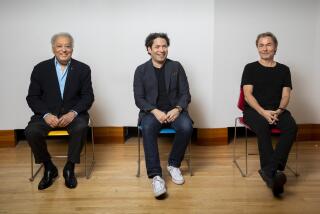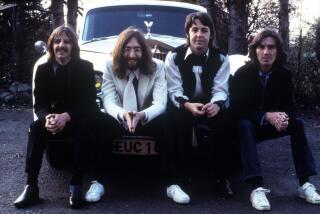TV REVIEW : âMcCartneyâs Oratorioâ Celebrates Family Life
Accessible and life-affirming to a fault, âPaul McCartneyâs Liverpool Oratorioâ begs to be liked. You can welcome this shaggy mutt of a crossover, feel-good epic into your home tonight, courtesy of KCET Channel 28 at 8 and KPBS Channel 15 at 8:30.
The piece was commissioned by the Royal Liverpool Philharmonic to celebrate its 150th anniversary this year, and the June 28 premiere performance in the Liverpool Cathedral forms the basis of the telecast. Introducing the 100-minute work, however, is a 50-minute documentary on the making of the oratorio.
This prologue seems designed primarily to assure us that although McCartney does not read or write standard music notation, his involvement was complete in every decision. American composer Carl Davis--associate conductor of the London Philharmonic--is billed as co-composer, but if the documentary accurately reflects their work, his labor was largely that of amanuensis.
Too long by half, the introduction gives away all of the big moments in a piece that is underpowered enough without also being anticlimatic. Tuning in late is a serious option for all but the most avid McCartney fans.
What McCartney and Davis have wrought is an eight-part âcelebration of family life,â in McCartneyâs words. The early portions are quasi-autobiographical interpretations of the former Beatleâs childhood, leading to marriage, crisis and redemption through parenthood.
McCartneyâs stand-in protagonist and narrator is Shanty, sung by tenor Jerry Hadley with ringing sound and fervent naivete. Soprano Kiri Te Kanawa sings Mary Dee, Shantyâs wife, purely and fluently, but with scant characterization. Smaller parts are persuasively sung by mezzo Sally Burgess and bass Willard White.
Both music and text are rooted in the traditions of the tonier kind of music theater, and both reach their nadir in the final ensemble benediction, where the pretension toward a cosmic spirituality achieves the level of a New Age greeting card--âGod is good without an o .â
The strongest scenes are the fourth, where Shanty discovers the uncertainty of mortality in his fatherâs death, and a sprightly Spanish divertimento at the end of Part II. The scoring is deft throughout, and vividly projected by the Liverpool Orchestra under Davis, with full-throated contributions from a large chorus and the cathedral boy choristers.
More to Read
The complete guide to home viewing
Get Screen Gab for everything about the TV shows and streaming movies everyoneâs talking about.
You may occasionally receive promotional content from the Los Angeles Times.






